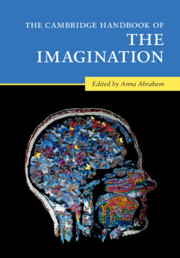Book contents
- The Cambridge Handbook of the Imagination
- The Cambridge Handbook of the Imagination
- Copyright page
- Dedication
- Contents
- Figures
- Contributors
- Acknowledgments
- 1 Surveying the Imagination Landscape
- Part I Theoretical Perspectives on the Imagination
- Part II Imagery-Based Forms of the Imagination
- Part III Intentionality-Based Forms of the Imagination
- 19 Continuities and Discontinuities Between Imagination and Memory: The View from Philosophy
- 20 Imagining and Experiencing the Self on Cognitive Maps
- 21 The Neuroscience of Imaginative Thought: An Integrative Framework
- 22 Imagination and Self-Referential Thinking
- 23 Imaginary Friends: How Imaginary Minds Mimic Real Life
- 24 Imagination and Moral Cognition
- 25 Moral Reasoning: A Network Neuroscience Perspective
- 26 The Future-Directed Functions of the Imagination: From Prediction to Metaforesight
- Part IV Novel Combinatorial Forms of the Imagination
- Part V Phenomenology-Based Forms of the Imagination
- Part VI Altered States of the Imagination
- Name Index
- Subject Index
- References
19 - Continuities and Discontinuities Between Imagination and Memory: The View from Philosophy
from Part III - Intentionality-Based Forms of the Imagination
Published online by Cambridge University Press: 26 May 2020
- The Cambridge Handbook of the Imagination
- The Cambridge Handbook of the Imagination
- Copyright page
- Dedication
- Contents
- Figures
- Contributors
- Acknowledgments
- 1 Surveying the Imagination Landscape
- Part I Theoretical Perspectives on the Imagination
- Part II Imagery-Based Forms of the Imagination
- Part III Intentionality-Based Forms of the Imagination
- 19 Continuities and Discontinuities Between Imagination and Memory: The View from Philosophy
- 20 Imagining and Experiencing the Self on Cognitive Maps
- 21 The Neuroscience of Imaginative Thought: An Integrative Framework
- 22 Imagination and Self-Referential Thinking
- 23 Imaginary Friends: How Imaginary Minds Mimic Real Life
- 24 Imagination and Moral Cognition
- 25 Moral Reasoning: A Network Neuroscience Perspective
- 26 The Future-Directed Functions of the Imagination: From Prediction to Metaforesight
- Part IV Novel Combinatorial Forms of the Imagination
- Part V Phenomenology-Based Forms of the Imagination
- Part VI Altered States of the Imagination
- Name Index
- Subject Index
- References
Summary
Though imagination and memory have much in common, philosophers of memory have so far had little to say about imagination. This has recently begun to change, as research on episodic memory as a form of imaginative mental time travel analogous to episodic future thought has threatened to undermine the view – standard in the philosophy of memory – that memory is sharply distinct from imagination. Covering a cluster of interrelated issues (including the objects of mental time travel, the reference of episodic thought, the epistemic openness of the future, the directness of our knowledge of the past, and immunity to error through misidentification in episodic memory and episodic future thought), this chapter surveys the debate between discontinuists, who argue that episodic remembering and episodic future thinking are processes of fundamentally different kinds, and continuists, who argue that the fact that they have distinct temporal orientations constitutes the only important difference between them – and hence that episodic memory is ultimately just a kind of episodic imagination.
- Type
- Chapter
- Information
- The Cambridge Handbook of the Imagination , pp. 293 - 310Publisher: Cambridge University PressPrint publication year: 2020
References
- 23
- Cited by

